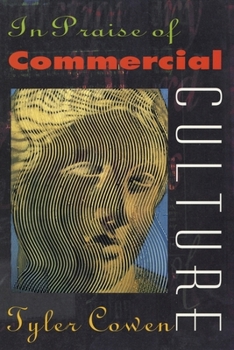In Praise of Commercial Culture
Select Format
Select Condition 
Book Overview
Does a market economy encourage or discourage music, literature, and the visual arts? Do economic forces of supply and demand help or harm the pursuit of creativity? This book seeks to redress the current intellectual and popular balance and to encourage a more favorable attitude toward the commercialization of culture that we associate with modernity. Economist Tyler Cowen argues that the capitalist market economy is a vital but underappreciated...
Format:Paperback
Language:English
ISBN:0674001885
ISBN13:9780674001886
Release Date:April 2000
Publisher:Harvard University Press
Length:288 Pages
Weight:1.05 lbs.
Dimensions:0.9" x 6.1" x 9.2"
Customer Reviews
5 ratings
The first book I know connecting arts and economics
Published by Thriftbooks.com User , 16 years ago
This book enables me to enjoy two of my interests at the same time-arts and economics. This is the first book I know that connects arts and economics.
Excellent Account of How Markets Promote Diversity In Art
Published by Thriftbooks.com User , 23 years ago
"In Praise of Commercial Culture" is Cowen's attempt to demonstrate that capitalism and economic growth promote, rather than squelch, individual creativity through artistic expression. In it, he provides a detailed history of the origin and development of markets for literature, painting, sculpture, and music. Throughout the book, he focuses on both pecuniary and non-pecuniary incentives that markets create for individuals to challenge prevailing artistic sentiments and express their creative energies in new and unique ways.He begins his economic analysis of art markets by stating that the creation of wealth enables people to address their aesthetic interests. Specifically, markets enable artists to free themselves from both the desires of wealthy patrons and the need to satisfy mainstream tastes. This enables outsiders who stand to gain little by appealing to mainstream conventions to take risks and establish new cultural ideas. He gives a number of examples of how members of ethnic minorities managed to break color barriers by creating new genres of music.In the area of books and literature, he asserts that the decentralization of editorial and financial decision-making enabled the number of publishers to skyrocket. He points out that small independent and university publishers can flourish in a commercial society by gathering capital for little-known authors who operate outside of popular spheres. He states that it has become more and more difficult for a small group of authors to dominate the attention of readers. He responds to the accusation that literary diversity diminishes fame-based incentives for authors by explaining that markets tend to increase the quantity of fame available to everyone over time. As a result, the quantity and quality of literature available to the public also increases over time.Cowen responds to critics from across the political spectrum. He deconstructs arguments brought against capitalistic art by neo-conservatives, religious leaders, neo-Marxists, feminists, multiculturalists, artists, and surprisingly, some libertarians. He explains that members of each group fear culture because it can produce rapid changes in people's worldviews. As unregulated culture cannot be controlled, people who have a vested interest in preserving certain ideas tend to oppose it. Thus, people who work in politics must limit human creativity to stay in power.Although his defense of government as a limited entrepreneur in the cultural market will rankle some readers, Cowen's account is a lively historical view of how markets reward individual creativity. Like Samuel Johnson, he praises the ability of markets to enable artists to turn their passions into livelihoods. He presents an effective critique of arguments that favor heavy government involvement in the artistic realm. Most importantly, he demonstrates why individuals should look forward to enjoying high quality artwork for years to come.
A stylish, intellectual tour de force
Published by Thriftbooks.com User , 25 years ago
What is quite extraordinary about Tyler Cowen's book is not his sohphisticated understanding of economics (one expects that), or even his ability to put across difficult problems clearly, but the breadth of his knowledge about art and music. The book is indispensable to anyone who claims an interest in arts policies.
An outstanding and original work.
Published by Thriftbooks.com User , 26 years ago
In this original and scholarly -- though never stuffy -- work, Tyler Cowen reveals not only a deep understanding of economics, but also a breathtaking knowledge of visual art, music (both classical and pop), and literature. His opening chapters show clearly how economics usefully sheds light on cultural issues. Subsequent chapters test his economics in various fields of art. Both Cowen and economics pass these tests impressively.Cowen's voice is a welcome addition to those of scholars (including that of Virginia Postrel) who praise cultural dynamism and who appreciate the enormous creative powers of a people free of political and bureaucratic burdens.
Concise and convincing argument for the cultural marketplace
Published by Thriftbooks.com User , 26 years ago
Tyler Cowen has done an outstanding job of making the case for free competition in cultural pursuits. Culture and commerce are revealed not as antagonists, but as complementary. The tension between them enriches both. Stands the Marxist cultural critique on its head. Must reading for anyone seriously interested in what has come to be called the "culture war."





